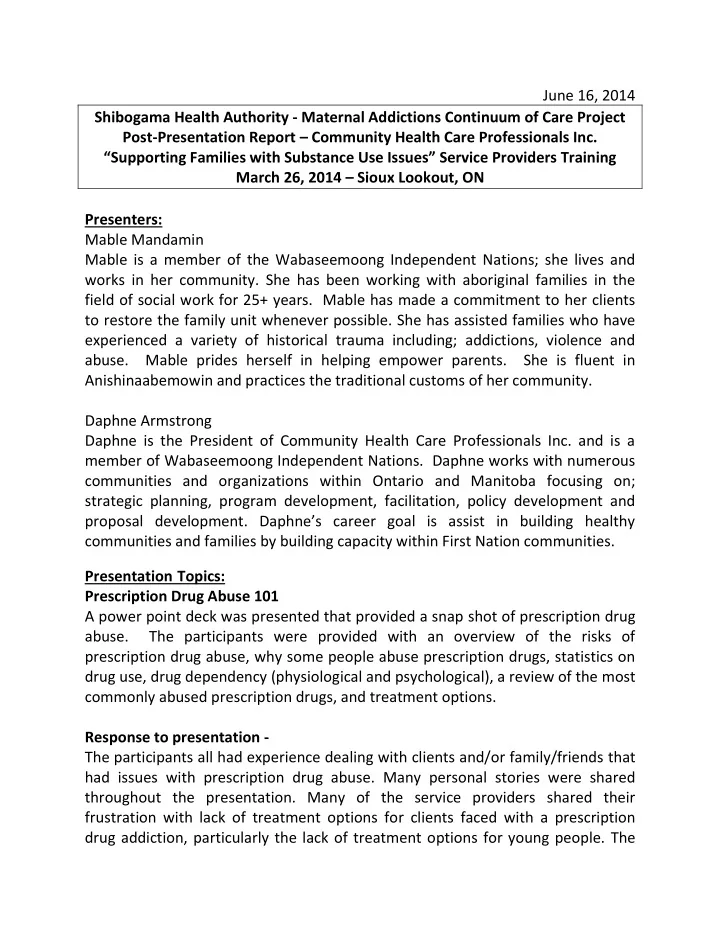

June 16, 2014 Shibogama Health Authority - Maternal Addictions Continuum of Care Project Post-Presentation Report – Community Health Care Professionals Inc. “Supporting Families with Substance Use Issues” Service Providers Training March 26, 2014 – Sioux Lookout, ON Presenters: Mable Mandamin Mable is a member of the Wabaseemoong Independent Nations; she lives and works in her community. She has been working with aboriginal families in the field of social work for 25+ years. Mable has made a commitment to her clients to restore the family unit whenever possible. She has assisted families who have experienced a variety of historical trauma including; addictions, violence and abuse. Mable prides herself in helping empower parents. She is fluent in Anishinaabemowin and practices the traditional customs of her community. Daphne Armstrong Daphne is the President of Community Health Care Professionals Inc. and is a member of Wabaseemoong Independent Nations. Daphne works with numerous communities and organizations within Ontario and Manitoba focusing on; strategic planning, program development, facilitation, policy development and proposal development. Daphne’s career goal is assist in building healthy communities and families by building capacity within First Nation communities. Presentation Topics: Prescription Drug Abuse 101 A power point deck was presented that provided a snap shot of prescription drug abuse. The participants were provided with an overview of the risks of prescription drug abuse, why some people abuse prescription drugs, statistics on drug use, drug dependency (physiological and psychological), a review of the most commonly abused prescription drugs, and treatment options. Response to presentation - The participants all had experience dealing with clients and/or family/friends that had issues with prescription drug abuse. Many personal stories were shared throughout the presentation. Many of the service providers shared their frustration with lack of treatment options for clients faced with a prescription drug addiction, particularly the lack of treatment options for young people. The
lack of detox and pre and post treatment options were also identified, many service providers felt helpless in supporting clients because options for treatment or care were difficult to access and navigating requirements for admission was difficult. Strategies to Build Trust and Relationships with Clients Participants were encouraged to share stories of how they build trust with clients and share approaches to relationship building. A best practice from Wabaseemoong Independent Nations was presented and the community’s work in building service continuity through on-going community based resource committee meetings. Participant Discussion - The group discussed that a resource fair would be strategy that they would like to try in order to get community members knowledgeable of services and programs available. Participants expressed interest in the “Wabaseemoong” approach. Attached to this report is the resource committee protocol and service directory to use as a guide to setting up a community based resource committee. The participants identified the following early intervention strategies: Socials/Family nights Family fun days Cookouts Camping with clients (learning traditional practices – fishing and fish prep) Church congregation Weight loss challenges Craft nights “Indian Idol” Sports Daycare activities Having a prenatal day at Nursing station with a prenatal questionnaire Radio: Traditional Parenting “Q&A” High school presentations: “Open” discussions – students identifying the topic Informal presentations Community kitchens Distributing pamphlets and program materials Distributing healthy food bags
Food hampers as prizes for community events The participants identified challenges that they are faced with in building relationships with clients: Trust Understanding confidentiality Language barrier Family Intervention: Supporting Caregivers and Parents The participants were provided with an overview of the child welfare system, focusing on how to support caregivers and parents who are in the system. The apprehension processed was discussed and what customary care is and how it is used. There was discussion of how to support the needs of the parents and the caregiver. The presentation concluded with strategies for families on how to “how to get out of the system” Participant Discussion – When discussing caregiver training, it was identified that there is limited statistics or information of the training that the caregivers might need. The group identified Al-Anon as a good support option for caregivers. In communities that there are not active AA and Al-Anon meetings, there was a discussion of accessing technology and web-based groups. The participants identified the need for volunteer based support groups in the community.
Recommend
More recommend